Further redox - Study guides, Revision notes & Summaries
Looking for the best study guides, study notes and summaries about Further redox? On this page you'll find 100 study documents about Further redox.
Page 2 out of 100 results
Sort by
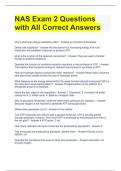
-
NAS Exam 2 Questions with All Correct Answers
- Exam (elaborations) • 12 pages • 2023
- Available in package deal
-
- £10.28
- + learn more
NAS Exam 2 Questions with All Correct Answers why is chemical energy needed by cells? - Answer-to maintain homeostasis Define cell respiration - Answer-the mechanism for harvesting energy from fuel molecules; the oxidation of glucose to produce ATP what is the function of the reduced coenzymes? - Answer-They are used to transfer energy to another compound Describe the function of oxidation-reduction reactions in the synthesis of ATP. - AnswerThe reaction that transports energy to reduce...
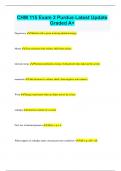
-
CHM 115 Exam 2 Purdue Latest Update Graded A+
- Exam (elaborations) • 5 pages • 2024
- Available in package deal
-
- £7.40
- + learn more
CHM 115 Exam 2 Purdue Latest Update Graded A+ Degeneracy Orbitals with a given n having identical energy Metals Lose electrons from valence shall form cations internal energy Potential and kinetic energy of all particles that make up the system nonmetals Add electrons to valence shells, form negative ions (anions) Work Energy transferred when an object moves by a force enthalpy total heat content of a system First law of thermodynamics ΔEsys = q + w What happens to enthalpy under constan...
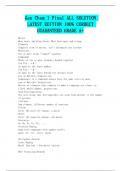
-
Gen Chem 1 Final ALL SOLUTION LATEST EDITION 100% CORRECT GUARANTEED GRADE A+
- Exam (elaborations) • 10 pages • 2024
-
- £10.69
- + learn more
Matter Most basic building block. Must have mass and volume Elements Simplest form of matter, can't decompose any further Molecules Two or more atoms "linked" together Compounds Mixes of two or more elements bonded together Sig Fig.- x & / As many as the least number Sig Fig.- + & - As many as the least behind the decimal point Law of Definite Composition Components in a compound always have the same ratio by mass Law of Multiple Proportions Ratios of elements that combine to m...
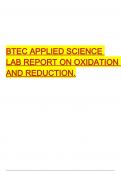
-
BTEC APPLIED SCIENCE LAB REPORT ON OXIDATION AND REDUCTION.
- Exam (elaborations) • 7 pages • 2023
-
- £6.08
- + learn more
BTEC APPLIED SCIENCE LAB REPORT ON OXIDATION AND REDUCTION. FND04: FURTHER CHEMISTRY FOR BIOSCIENCES - LAB REPORT Oxidation and Reduction (REDOX) Reactions Introduction Oxidation-reduction reactions, otherwise known as redox reactions, are fundamentally a process that involves a transfer of electrons. Oxidation can be defined as loss of electrons and reduction as gain of electrons. Therefore, oxidation results in an increase in oxidation number and reduction a decrease in oxidation numb...
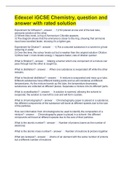
-
Edexcel iGCSE Chemistry, question and answer with rated solution
- Exam (elaborations) • 29 pages • 2023
- Available in package deal
-
- £16.87
- 1x sold
- + learn more
Edexcel iGCSE Chemistry, question and answer with rated solution Experiment for Diffusion? 1) HCl placed at one end of the test tube, ammonia solution at the other. 2) Where they meet, a ring of Ammonium Chloride appears. 3) The diagram shows that the ammonia is closer to the ring, showing that ammonia must have travelled faster, showing it's a lighter gas. Experiment for Dilution? 1) Put a coloured substance in a solvent e.g food colouring in water. 2) Over the time, the colour le...
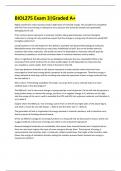
-
BIOL275 Exam 3|Graded A+
- Exam (elaborations) • 7 pages • 2024
-
- £8.64
- + learn more
BIOL275 Exam 3|Graded A+ Highly exothermic redox reactions lead to high levels of released energy. This wouldn't be compatible with life if too much energy is released at once, because this would be wasteful and potentially damaging to the cell. If the cartoon above represents a molecular reaction taking place between common biological molecules in a living cell, why would we expect that the change in energy level of electrons would NOT be highly exothermic? Living functions in the cell depe...
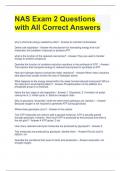
-
NAS Exam 2 Questions with All Correct Answers
- Exam (elaborations) • 12 pages • 2024
- Available in package deal
-
- £7.81
- + learn more
NAS Exam 2 Questions with All Correct Answers why is chemical energy needed by cells? - Answer-to maintain homeostasis Define cell respiration - Answer-the mechanism for harvesting energy from fuel molecules; the oxidation of glucose to produce ATP what is the function of the reduced coenzymes? - Answer-They are used to transfer energy to another compound Describe the function of oxidation-reduction reactions in the synthesis of ATP. - AnswerThe reaction that transports energy to reduce...
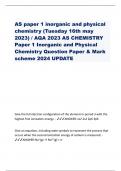
-
AS paper 1 inorganic and physical chemistry (Tuesday 16th may 2023) / AQA 2023 AS CHEMISTRY Paper 1 Inorganic and Physical Chemistry Question Paper & Mark scheme 2024 UPDATE
- Exam (elaborations) • 6 pages • 2024
-
- £14.81
- + learn more
AS paper 1 inorganic and physical chemistry (Tuesday 16th may 2023) / AQA 2023 AS CHEMISTRY Paper 1 Inorganic and Physical Chemistry Question Paper & Mark scheme 2024 UPDATE Give the full electron configuration of the element in period 3 with the highest first ionisation energy. - ANSWER-1s2 2s2 2p6 3p6 Give an equation, including state symbols to represent the process that occurs when the second ionisation energy of sodium is measured. - ANSWER-Na⁺(g) → Na²⁺(g) + e⁻ Describe the str...
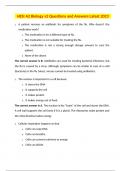
-
HESI A2 Biology v2 Questions and Answers Latest 2023 1. A patient receives an antibiotic for symptoms of the flu. Why doesn’t the medication work? a. The medication is for a different type of flu. b. The medication is not suitable for treating the flu. c
- Exam (elaborations) • 49 pages • 2024
-
- £13.16
- 1x sold
- + learn more
HESI A2 Biology v2 Questions and Answers Latest 2023 1. A patient receives an antibiotic for symptoms of the flu. Why doesn’t the medication work? a. The medication is for a different type of flu. b. The medication is not suitable for treating the flu. c. The medication is not a strong enough dosage amount to cure the patient. d. None of the above The correct answer is B. Antibiotics are used for treating bacterial infections, but the flu is caused by a virus. Although symptoms can be si...
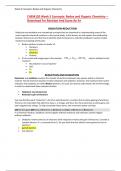
-
CHEM120 Week 5 Concepts: Redox and Organic Chemistry – Download For Revision And Score An A+
- Other • 16 pages • 2024
- Available in package deal
-
- £12.75
- + learn more
CHEM120 Week 5 Concepts: Redox and Organic Chemistry – Download For Revision And Score An A+ OXIDATION-REDUCTION Reduction and oxidation are intertwined concepts that are important to understand ing some of the most important chemical reactions in the human body. In this lesson, we will explore the relationship between these terms and the how to identify what chemicals in a reduction/oxidation reaction (redox reaction) are playing which parts. 1. Redox reactions involve a transfer of: ▪ Nucl...

How much did you already spend on Stuvia? Imagine there are plenty more of you out there paying for study notes, but this time YOU are the seller. Ka-ching! Discover all about earning on Stuvia


